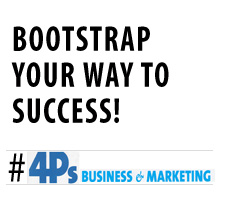BOOTSTRAP YOUR WAY TO SUCCESS!
The term ‘bootstrapping’ is an interesting term. It has a lot of challenge, a lot of drama built into it.
The term is attributed to a story written by Rudolf Erich. The story titled The Surprising Adventures of Baron Munchausen is based on a series of tales narrated by the Baron about his travels, with some impossible feats and daring escapes. One such tale is about him pulling himself out of a swamp with the help of his bootstraps as there was no one to help him and there was no other way he could have survived. Today, this 18th century tale has acquired a new meaning; especially for entrepreneurs. The idiom “pull yourself up by your bootstraps” is the secret behind the success of many people today. When all else failed, they looked at the end of their own arm and found a helping hand! Just the way when the Baron fell in the swamp and nothing seemed to work and it looked like all was lost, he thought of picking himself up by his own bootstraps.
This little boy used to walk barefoot to school. He used to sit on the floor in the classroom, as he was not allowed to sit on the desk; neither could he enter the temple of his village, for he was considered ‘unclean’ because he belonged to a lower caste. Ashok Khade is today a multi-millionaire who has Arabs as his business partners. A poor cobbler’s son, he had no money. He could barely finish his college and in spite of being a good student, he had to drop out and take up a job as an apprentice draftsman at the Mazagon Dock. His dreams of becoming a doctor were shattered, but he continued to work hard and became the best draftsman in the company. One day, his boss sent him to Germany for work. There, he chanced to see the paychecks of the Germans and was shocked to find how much they made in a month. This motivated him to work harder.
When everyone refused to help him, he decided to pull himself up by his own bootstraps and do something different. He worked hard; and at the right time, he started his own small company… something that was unthinkable at that time, when no one thought of leaving a steady job and taking this huge risk. It paid off and he soon got his first contract and then his second; and today, he has his own business empire, and his own voice. He organizes seminars where businessmen of his community (Dalit) give advice to companies like Tata Motors. He even persuades the government to give contracting preferences to Dalits, and the private companies to create job opportunities for people of his community.
BOOTSTRAP OR GET THE BOOT
Success in entrepreneurship has a lot to do with strategic planning. The most important planning is the one related to finances. Smart financial management is one of the most important keys to success.
Bootstrap basically refers to growing a business organically with little initial investment. It is a challenging and interesting option as it forces you to think creatively and figure out a business model that works and actually generates revenues for you. Consider the story of this 17 year old boy who left Durgapur, just after his class 12 board exams, because his mother could feed him no more. Hunger drove him to Mumbai where he did any odd job he could find. He then got a job as a courier boy in a pharma company. When the drive to achieve something is high, a man can find opportunities anywhere. Sudip Dutta, the little boy, spent his evenings in the same company learning how to make the pouches that the pharma company used to pack its medicines in. It brought him Rs.15 extra. He had no money, so he worked day and night and slept in the factory itself. Two years later, the factory owner sunk under debt and decided to sell the factory. The ‘bootstrapping’ entrepreneur inside Dutta saw this as an opportunity of a lifetime and he went to negotiate with his owner. He had no money in the bank, but only his hard work to bank on. He came up with an intelligent option. He told the owners to sell the business to him and he would pay them back in installments. The deal was that he would give them all the profits he earned from the business after he had deducted the workers salaries and Rs.5,000 for himself. The owner saw it as a win-win option and agreed. Within 2 years, Sudip had made the company debt-free and today, it’s a whopping Rs.700 crore business. He named his company Ess Dee Aluminum, which are the initials of his name. Today, Dutta is the undisputed leader of the aluminum foil business. He still loves his ‘pantha bhat’ and never forgets where he came from – a quality that makes each of these ‘bootstrapping businessmen’ so successful. Not only do they retain their humility, not only do they find creative ways of doing things, but they also learn to never ever give up.
Lakshaman belonged to a family of farmers, where his father used to make money by sharing in the produce of the farmers. However, the old-fashioned farm implements made life very tough and profits very less. It used to take two months to separate the grain from the chaff using bullocks; and many a time, rain used to spoil the crops. He used to hear his father cry in the nights and it pained him. He wanted to change things, but there was no money to invest. There was no money for anything in fact. Lakshaman had weak eyesight, but could not afford to buy spectacles. That did not deter him from studying. He used to sit as close to the black board as possible. His teachers rebuked him, but nothing mattered as his will to succeed made him overcome all obstacles. One day, he and his friend chanced to see a Japanese rice-thresher machine and decided to develop a wheat thresher on the same lines. Young Lakshaman convinced his family to put in all their money into making the wheat-thresher, as it would help in quick threshing of the wheat.
The machine failed; The family was bankrupt. The machine found few takers. Not one to give up easily, he reworked on the machine and found that instead of ‘round cutters’ they had used ‘straight cutters’. The design was changed... and it worked. But all this also gave the young boy an idea to start a new business of ‘farm implements’. Within a few years, he was making tractors; and today, his company ‘Sonalika Group’ is worth $785 million. And this year, in 2012, Lakshaman Mittal was ranked as the 75th richest man in the Forbes’ Indian Billionaires list.
Bootstrap entrepreneurs learn to make the most of each penny, and get the returns
to the fullest. They care not for adversaries but they do have the uncanny knack of spotting an opportunity even in the most adverse of situations.
BOOTSTRAP AND CUT OUT THE CRAP
When you don’t have enough or rather when you have nothing at all, you learn to focus only on the essential and cut out the things that don’t matter. It was in 2005 that Sridhar Vembu decided to challenge software biggies like Google and Microsoft with the help of his ‘bootstrap ideas’.
In 1995, this IIT graduate went looking for venture capitalists who would fund his business plan of making a software for telecom networks. No one was interested, but he did not give up and bootstrapped his operations, and started a small company in Silicon Valley. He soon started ‘Zoho’, which is a series of web-based programs. His success point is his bootstrapping philosophy i.e. of keeping costs very low and hence being able to sell his software at very low costs. He does so by not spending much on marketing, using free technology wherever possible, and most importantly, by keeping his employee recruitment costs to a minimum. He was very clear that a software does not have to be expensive and one does not have to be an IIT or an MIT graduate to develop world class products. He decided to hire undergraduates
from local schools of his native town in Tamil Nadu. He looked beyond traditional methods of hiring and today, he does not have to waste time or money handling restless & overambitious engineers from top engineering colleges. Vembu founded the ‘Zoho University’. His students were fresh undergraduates from poor backgrounds who he handpicked after going from school to school.
Then he gave them a one year training , a laptop, free lunch and dinner, classes in English and Mathematics apart from software training, and even a stipend of Rs.6,000. He then absorbed them into Zoho and today gives them salaries comparable to the salaries of people who have joined him from IIT, et al. These brilliant students from poor backgrounds work in tandem with the IIT engineers at Zoho and create world class office and business applications; comparable to those offered by Google, Salesforce.com, Microsoft et al. He was cash strapped and that made him think differently and it is this that helped him find a way to create his own talent by starting Zoho University.
In today’s world, only those who think like these bootstrapped entrepreneurs have the highest chances of success. Think frugal, think innovative and continuously find new ways of doing business. A business based on this kind of thinking is generally a very stable business, for it can scale up or scale down whenever required. It has people at the top who know how to think differently, who know how to survive the tough times, and who never give up because they know that they can make it work, come what may. They have the ability to make the maximum use of the minimum that they have.
If you are planning to start a business, expand a business or even just planning to study business, train yourself to think the ‘bootstrap way’; for in the long run, the winners are those who have learnt to bootstrap their way to success.





Comments
Post a Comment